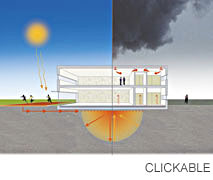Weather compensation
The efficiency of a heating system can be improved by more sophisticated controls that take into account the ambient temperature outside.
Knowledge of the outside temperature allows the control system to anticipate the internal heating demand instead of reacting to it.
Heating systems work more efficiently when they distribute warm water through your heating system rather than hot water: this will be sufficient to warm your building in mild weather and be cheaper to run.
A boiler – or a ground source heat pump – can be "modulated" to run below its full capacity and runs more efficiently on part load. This is preferable to running at full capacity for short bursts and then "cycling" on and off at frequent intervals. This also applies when the internal temperature is approaching the set point.
Weather compensation improves the comfort level in your building
When the external temperature drops quickly, the control system will detect this before the internal thermostat reacts: the control system can provide a gentle level of heating before the room temperatures drop. This means that the room temperature will not drop as far as it would have done if it had waited for the thermostat signal. It also means that an even temperature can be provided at a lower cost of energy.
However, if the external temperature is very low then the boiler – or the heat pump – can be set to work at full capacity to provide sufficient heat to warm your building quickly. This also applies when the internal temperature is far below the desired set point.
Such "weather compensation" is a smart way to improve the efficiency of heating systems. It can not only control the internal temperature more precisely and thus provide a more consistent comfortable temperature, but also extend the life of your equipment by putting it under less strain when full power is not called for.
Weather compensation controls reduce your fuel bills
The energy savings from employing weather compensation controls in conjunction with modulating boilers – or modulating heat pumps – can be as high as 20%.
See Ground Source Heating See Ground Source Cooling See Ground Source Energy



